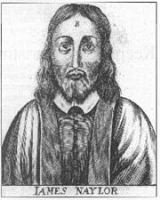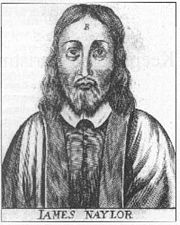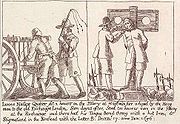
James Nayler
Encyclopedia

England
England is a country that is part of the United Kingdom. It shares land borders with Scotland to the north and Wales to the west; the Irish Sea is to the north west, the Celtic Sea to the south west, with the North Sea to the east and the English Channel to the south separating it from continental...
Quaker
Religious Society of Friends
The Religious Society of Friends, or Friends Church, is a Christian movement which stresses the doctrine of the priesthood of all believers. Members are known as Friends, or popularly as Quakers. It is made of independent organisations, which have split from one another due to doctrinal differences...
leader. He is among the members of the Valiant Sixty
Valiant Sixty
The Valiant Sixty were a group of early leaders and activists in the Religious Society of Friends . They were itinerant preachers, mostly from northern England who spread the ideas of the Friends during the second half of the Seventeenth Century, and were also called the First Publishers of Truth...
, a group of early Quaker preachers and missionaries. At the peak of his career, he preached against enclosure
Enclosure
Enclosure or inclosure is the process which ends traditional rights such as mowing meadows for hay, or grazing livestock on common land. Once enclosed, these uses of the land become restricted to the owner, and it ceases to be common land. In England and Wales the term is also used for the...
and the slave trade.
Early life
He was born in the town of Ardsley in YorkshireYorkshire
Yorkshire is a historic county of northern England and the largest in the United Kingdom. Because of its great size in comparison to other English counties, functions have been increasingly undertaken over time by its subdivisions, which have also been subject to periodic reform...
. In 1642 he joined the Parliamentarian
Roundhead
"Roundhead" was the nickname given to the supporters of the Parliament during the English Civil War. Also known as Parliamentarians, they fought against King Charles I and his supporters, the Cavaliers , who claimed absolute power and the divine right of kings...
army, and served as quartermaster under John Lambert
John Lambert (general)
John Lambert was an English Parliamentary general and politician. He fought during the English Civil War and then in Oliver Cromwell's Scottish campaign , becoming thereafter active in civilian politics until his dismissal by Cromwell in 1657...
until 1650.
Religious experience
After experiencing what he described as the voice of GodGod
God is the English name given to a singular being in theistic and deistic religions who is either the sole deity in monotheism, or a single deity in polytheism....
calling him from work in his fields, Nayler gave up his possessions and began seeking a spiritual direction, which he found in Quakerism after meeting George Fox
George Fox
George Fox was an English Dissenter and a founder of the Religious Society of Friends, commonly known as the Quakers or Friends.The son of a Leicestershire weaver, Fox lived in a time of great social upheaval and war...
in 1652. Nayler became the most prominent of the traveling Quaker evangelists known as the "Valiant Sixty
Valiant Sixty
The Valiant Sixty were a group of early leaders and activists in the Religious Society of Friends . They were itinerant preachers, mostly from northern England who spread the ideas of the Friends during the second half of the Seventeenth Century, and were also called the First Publishers of Truth...
"; he attracted many converts and was considered a skilled theological debater. By all accounts an extremely charismatic man with a somewhat Christ
Christ
Christ is the English term for the Greek meaning "the anointed one". It is a translation of the Hebrew , usually transliterated into English as Messiah or Mashiach...
-like appearance, he also attracted a loyal personal following, which some other Quakers regarded with suspicion.
On several occasions, Fox expressed concern that the ministry of Nayler and his associate Martha Simmonds was becoming over-enthusiastic and erratic. Though the substance of the disagreements is unclear, by 1656 Fox and Nayler were hardly on speaking terms. On 23 September 1656, Fox visited Nayler in his prison at Exeter; when the prisoner refused to kiss his hand, Fox pushed his foot toward him, "It is my foot." It was clearly not a gesture that looked toward reconciliation, Fox never apologized, and the differences remained. Prominent Quaker author, Rufus M. Jones, however, gives a reverse description of the encounter:
Nayler tried to make a show of love and would have kissed Fox, but the latter would receive no sham kisses from one whose spirit was plainly wrong. "James," he said, "it will be harder for thee to get down thy rude company [of followers] than it was for thee to set them up."
Bristol event
In October 1656, Nayler and his friends, including Simmonds, staged a demonstration which proved disastrous: Nayler reenacted the arrival of Christ in Jerusalem that is commemorated on Palm SundayPalm Sunday
Palm Sunday is a Christian moveable feast that falls on the Sunday before Easter. The feast commemorates Jesus' triumphal entry into Jerusalem, an event mentioned in all four Canonical Gospels. ....
, riding on into Bristol
Bristol
Bristol is a city, unitary authority area and ceremonial county in South West England, with an estimated population of 433,100 for the unitary authority in 2009, and a surrounding Larger Urban Zone with an estimated 1,070,000 residents in 2007...
on a donkey, attended by followers who sang "Holy, holy, holy" and strewed the muddy path with garments. Though Nayler denied that he was impersonating Jesus and said rather that "Christ was in him" (consistent with the Quaker doctrine of the Inner light
Inner light
Inner Light is a concept which many Quakers, members of the Religious Society of Friends, use to express their conscience, faith and beliefs. Each Quaker has a different idea of what they mean by "inner light", and this also varies internationally between Yearly Meetings, but the idea is often...
), he refused to comment further on the meaning of the action, and the ecstatic devotion of his followers convinced many that he had messianic
Messiah
A messiah is a redeemer figure expected or foretold in one form or another by a religion. Slightly more widely, a messiah is any redeemer figure. Messianic beliefs or theories generally relate to eschatological improvement of the state of humanity or the world, in other words the World to...
pretensions. On 16 December 1656 he was convicted of blasphemy
Blasphemy
Blasphemy is irreverence towards religious or holy persons or things. Some countries have laws to punish blasphemy, while others have laws to give recourse to those who are offended by blasphemy...
in a highly publicized trial before the Second Protectorate Parliament
Second Protectorate Parliament
The Second Protectorate Parliament in England sat for two sessions from 17 September 1656 until 4 February 1658, with Thomas Widdrington as the Speaker of the House of Commons...
. Narrowly escaping execution, he was pilloried and whipped through the streets of London, was branded with the letter B on his forehead, had his tongue pierced with a hot iron, and was then transported back to Bristol to be whipped through its streets too, before enduring two years imprisonment
Prison
A prison is a place in which people are physically confined and, usually, deprived of a range of personal freedoms. Imprisonment or incarceration is a legal penalty that may be imposed by the state for the commission of a crime...
at hard labour.
Aftermath

Nayler left prison in 1659 a physically ruined man; he repented his actions and was formally (but reluctantly) forgiven by Fox, who apparently required his former associate to kneel before him and ask forgiveness. He did join Quaker critics of the collapsing regime and begin to write condemnations of the nation's rulers. In October 1660, while traveling to rejoin his family in Yorkshire
Yorkshire
Yorkshire is a historic county of northern England and the largest in the United Kingdom. Because of its great size in comparison to other English counties, functions have been increasingly undertaken over time by its subdivisions, which have also been subject to periodic reform...
, he was robbed and left near death in a field, then brought to the home of a Quaker doctor in Kings Ripton
Kings Ripton
Kings Ripton is a village and civil parish in Huntingdonshire , England, and is located NNE of Huntingdon. The village is within the Upwood and The Raveleys ward of Huntingdonshire District Council...
. A day later and two hours before he died on 21 October, aged 42, he made a moving statement, that many Quakers value:
There is a spirit which I feel that delights to do no evil, nor to revenge any wrong, but delights to endure all things, in hope to enjoy its own in the end. Its hope is to outlive all wrath and contention, and to weary out all exaltation and cruelty, or whatever is of a nature contrary to itself. It sees to the end of all temptations. As it bears no evil in itself, so it conceives none in thoughts to any other. If it be betrayed, it bears it, for its ground and spring is the mercies and forgiveness of God. Its crown is meekness, its life is everlasting love unfeigned; it takes its kingdom with entreaty and not with contention, and keeps it by lowliness of mind. In God alone it can rejoice, though none else regard it, or can own its life. It is conceived in sorrow, and brought forth without any to pity it, nor doth it murmur at grief and oppression. It never rejoiceth but through sufferings; for with the world’s joy it is murdered. I found it alone, being forsaken. I have fellowship therein with them who lived in dens and desolate places in the earth, who through death obtained this resurrection and eternal holy life.
There Is A Spirit: The Nayler Sonnets is a collection, first published in 1945, of 26 poems by Kenneth Boulding, each inspired by a four- to sixteen-word portion of Nayler's dying statement (and also includes the intact statement).
The "There is a spirit ..." statement forms section 19.12 of Britain Yearly Meeting
Britain Yearly Meeting
The Yearly Meeting of the Religious Society of Friends in Britain, also known as Britain Yearly Meeting , is a religious organisation in England, Scotland, Wales, the Channel Islands and the Isle of Man, often defined as a denomination of Christianity.It is a part of the international religious...
's anthology Quaker Faith and Practice
Quaker Faith and Practice
A Book of Discipline may refer to one of the various books issued by a Yearly Meeting of the Religious Society of Friends, setting out what it means to be a Quaker in that Yearly Meeting...
.
The 2007 Swarthmore Lecture
Swarthmore Lecture
Swarthmore Lecture is one of a series of lectures, started in 1908, addressed to Britain Yearly Meeting of the Religious Society of Friends .The preface to the very first lecture explains the purpose of the series....
has the title Ground and Spring, taken from Nayler's "There is a spirit . . ." statement.
Publications
A collected edition of the Tracts of Nayler appeared in 1716, edited by his friend (and important early Quaker) George WhiteheadGeorge Whitehead (Quaker leader)
George Whitehead was a leading early Quaker preacher, author and lobbyist remembered for his advocacy of religious freedom before three kings of England. His lobbying in defense of the right to practice the Quaker religion was influential on the Act of Uniformity, the Bill of Rights of 1689 and...
, though Whitehead omitted Nayler's more controversial works. See A Relation of the Life, Conversion, Examination, Confession, and Sentence of James Nayler (1657); a Memoir of the Life, Ministry, Trial, and Sufferings of James Nayler (1719); and a Refutation of some of the more Modern Misrepresentations of the Society of Friends commonly called Quakers, with a Life of James Nayler, by Joseph Gurney Bevan (1800).
See also
- Leo DamroschLeo DamroschLeo Damrosch is an American author and professor. In 2001, he was named the Ernest Bernbaum Professor of Literature at Harvard University. He received a B.A. from Yale University, an M.A. from Cambridge University, where he was a Marshall Scholar, and a Ph.D. from Princeton University. His areas...
, The sorrows of the Quaker Jesus ISBN 0-674-82143-2 - The James Nayler Foundation
External links
- James Nayler's "There is a spirit . . ." Statement
- Passages detailing James Naylers ride into Bristol from Bristol Past And Present by J. F. Nicholls and John Taylor published in 1882.. In German.
----

